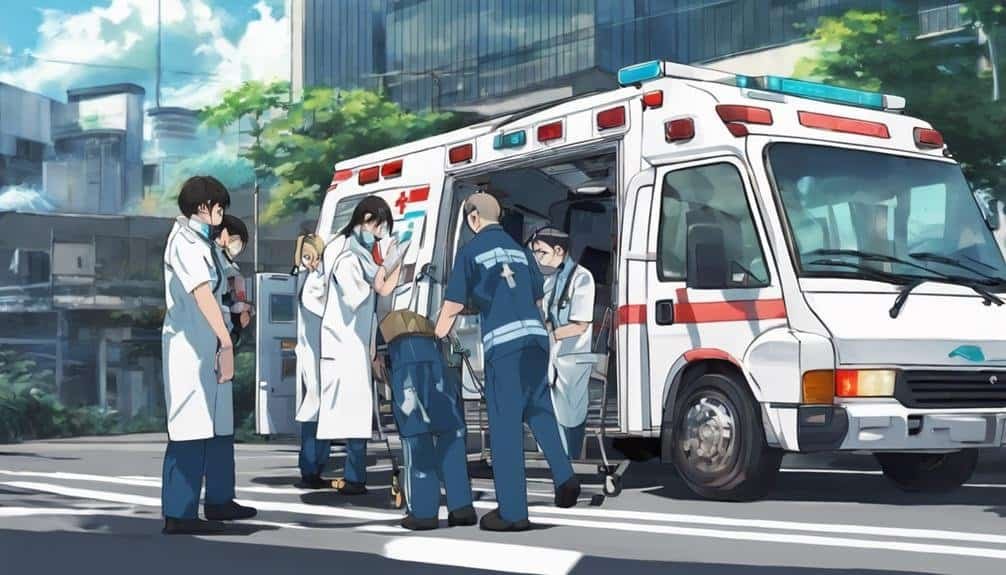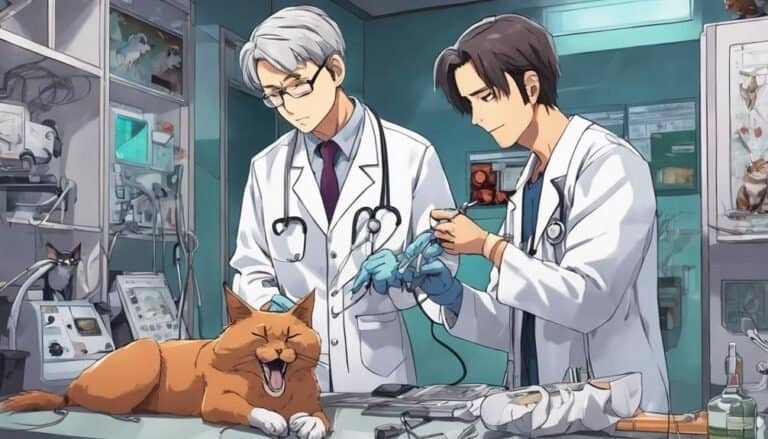Job Duties for Paramedic
Paramedics play an essential role in the healthcare system as first responders in emergency situations. They are tasked with a wide range of responsibilities, from evaluating and treating patients to operating complex medical equipment.
However, their job duties go beyond just providing medical care. The ability to remain calm under pressure and make critical decisions can truly define the success of a paramedic.
Stay tuned to discover the intricate details of what it takes to excel in this demanding yet rewarding profession.
Key Takeaways
- Provide immediate medical assistance and stabilization in emergency situations.
- Administer prompt and accurate treatments, prioritizing based on severity.
- Manage medical equipment, medication administration, and adverse reactions efficiently.
- Communicate effectively, document thoroughly, and prioritize professional development for optimal patient care.
Emergency Response
In the domain of emergency response, paramedics are tasked with providing immediate medical assistance and critical care to individuals in need of urgent medical attention. First responder training equips paramedics with the necessary skills to assess situations quickly and provide appropriate medical interventions. Emergency dispatch plays a pivotal role in coordinating the response of paramedic teams to different locations efficiently.
When faced with trauma response situations, paramedics must employ their training to stabilize patients, control bleeding, and make certain airways are clear. Critical care management is paramount in making certain that patients receive the necessary interventions to sustain life until they reach a medical facility. Paramedics are trained to administer medications, perform CPR, and use advanced medical equipment to support patients in critical conditions effectively.
Patient Assessment
Given the critical nature of emergency response scenarios, paramedics must conduct thorough and precise patient evaluations to determine the appropriate course of medical action swiftly. Triage prioritization is a fundamental aspect of patient evaluation, allowing paramedics to identify and prioritize the treatment of individuals based on the severity of their condition. Effective patient communication is key during this process, as it helps gather important information and reassures the individual in distress.
Paramedics begin by evaluating signs such as heart rate, blood pressure, respiratory rate, and temperature. These measurements provide valuable insights into the patient's current physiological state. Simultaneously, obtaining a detailed medical history is important to understand any pre-existing conditions, allergies, or medications that could impact the treatment plan. This information guides paramedics in making informed decisions regarding the appropriate interventions.
Treatment Administration
Administering treatments with precision and efficiency is a critical responsibility for paramedics in providing timely medical care to patients in need. Following treatment protocols is important to guarantee the appropriate interventions are administered promptly. Paramedics must possess excellent clinical skills to assess the patient's condition accurately and determine the most suitable course of action. In emergency scenarios, quick thinking and the ability to prioritize treatments based on the severity of the patient's condition are essential.
Patient care is at the forefront of treatment administration for paramedics. They must communicate effectively with patients to gain necessary information and provide reassurance during procedures. Monitoring the patient's response to treatment and adjusting interventions as needed is also part of the paramedic's role. Adhering to established protocols and guidelines guarantees that patients receive standardized, high-quality care in various medical emergencies. Paramedics play an important role in the healthcare system by delivering efficient and effective treatments to those in urgent need.
Medical Equipment Operation
Operating a variety of medical equipment with precision and expertise is a fundamental aspect of a paramedic's role in providing essential emergency medical care. Paramedics are trained to handle various medical devices, ensuring they are functioning correctly to aid in diagnosing and treating patients effectively.
Here are key points related to medical equipment operation in paramedic duties:
- Equipment Maintenance: Paramedics are responsible for regularly inspecting and maintaining medical equipment to guarantee it is in top working condition when needed during emergencies.
- Troubleshooting: In the fast-paced environment of emergency medical services, paramedics must be adept at troubleshooting equipment malfunctions quickly and efficiently to avoid disruptions in patient care.
- Technology Integration and Advancements: With the continuous evolution of medical technology, paramedics must stay updated on the latest advancements and integrate new equipment into their practice to enhance patient outcomes. Adapting to technological changes is essential for delivering high-quality pre-hospital care.
Trauma Care
Paramedics play an essential role in providing critical trauma interventions. They utilize their advanced training to stabilize and treat patients experiencing severe injuries. Rapid assessment techniques are employed to quickly identify life-threatening conditions and prioritize care to maximize patient outcomes.
Through a combination of skill, experience, and swift decision-making, paramedics excel in managing traumatic incidents with precision and efficiency.
Critical Trauma Interventions
In the domain of critical trauma interventions within the scope of paramedic work, swift and decisive actions are paramount to ensuring the stabilization and care of trauma patients. Paramedics trained in trauma response and critical care play a pivotal role in managing traumatic incidents effectively.
Key aspects of critical trauma interventions include:
- Advanced Airway Management: Ensuring proper oxygenation and ventilation through techniques like intubation or supraglottic airway devices.
- Hemorrhage Control: Employing techniques such as direct pressure, tourniquets, or hemostatic agents to manage bleeding and prevent hypovolemic shock.
- Splinting and Immobilization: Stabilizing fractures and preventing further injury by effectively immobilizing affected limbs or body parts.
Rapid Assessment Techniques
Efficient and systematic rapid assessment techniques form a foundational aspect of trauma care provided by paramedics in emergency situations. Triage techniques are essential for response prioritization, enabling paramedics to quickly assess and categorize the severity of multiple casualties.
Rapid patient evaluation is vital for making critical decisions regarding the order of treatment and transport. Paramedics utilize their training to swiftly evaluate patients, identifying life-threatening conditions that require immediate attention. This rapid assessment process is guided by protocols and experience, allowing paramedics to prioritize care based on the severity of injuries.
Through effective triage techniques and rapid patient evaluation, paramedics can efficiently allocate resources and provide timely interventions to those in critical need during emergencies.
Cardiac Arrest Management
With a focus on rapid response and precise interventions, the management of cardiac arrest is a critical aspect of a paramedic's job duties. When faced with a cardiac arrest situation, paramedics must be well-versed in the following key areas:
- CPR Techniques and Defibrillator Use: Paramedics are trained in advanced CPR techniques to effectively perform chest compressions and provide artificial respiration. Additionally, they are skilled in operating defibrillators to deliver an electric shock to the heart in cases of ventricular fibrillation or pulseless ventricular tachycardia.
- EKG Interpretation: Paramedics must possess the expertise to interpret electrocardiograms (EKGs) accurately. This skill enables them to identify various cardiac arrhythmias promptly and make critical decisions regarding the appropriate course of action.
- Medication Protocols: Paramedics are responsible for administering medications following specific protocols during cardiac arrest scenarios. This includes understanding the indications, contraindications, dosages, and routes of administration for various emergency medications to ensure the best patient outcomes.
Medication Administration
Paramedics play an essential role in medication administration. This requires precision in drug dosage calculation to guarantee patient safety. They must carefully select the appropriate medication route, considering factors like the patient's condition and the medication's onset of action.
Additionally, paramedics must be prepared to manage any adverse reactions that may occur. They need to implement swift and effective interventions to safeguard the patient's well-being.
Drug Dosage Calculation
Effective medication administration in the field of emergency medical services requires precise drug dosage calculations to guarantee patient safety and ideal therapeutic outcomes. Paramedics must be well-versed in drug interaction monitoring and accurate dosage calculation, drawing on their intensive paramedic training and in-depth pharmacology knowledge.
To confirm successful drug dosage calculations, paramedics must consider factors such as the patient's weight, age, and medical history. Additionally, they need to double-check medication orders and calculations to prevent errors that could jeopardize patient care.
Paramedics are responsible for calculating dosages quickly and accurately, as even small errors in drug administration can have significant consequences for patients' health and well-being.
Medication Route Selection
To guarantee the best therapeutic outcomes and patient safety, paramedics must carefully consider the appropriate medication route for administration during emergency medical care.
Paramedics need to be well-versed in drug interactions awareness and adhere to patient safety protocols to prevent adverse effects. Proper dosage techniques are vital to make sure the medication's effectiveness without causing harm.
Paramedics must also follow medication storage guidelines to maintain drug potency and integrity. By selecting the correct medication route based on the patient's condition and the medication's properties, paramedics can expedite treatment delivery and improve patient outcomes.
Attention to detail in medication route selection is paramount in providing high-quality prehospital care while minimizing risks associated with medication administration.
Adverse Reaction Management
When managing adverse reactions during medication administration, meticulous observation and swift intervention are essential components of ensuring patient safety and best treatment outcomes. Paramedics must be adept at recognizing adverse reactions and taking immediate action to address them effectively. This includes continuous patient monitoring for any signs of adverse reactions and being prepared to intervene promptly.
Key aspects of adverse reaction management include:
- Adverse reaction recognition: Paramedics must be vigilant in identifying any unexpected or adverse responses to medications.
- Treatment: Quick and appropriate measures must be taken to address adverse reactions, which may involve stopping the medication, administering antidotes, or providing supportive care.
- Patient monitoring and intervention: Continuous monitoring and timely intervention are critical in managing adverse reactions and ensuring patient well-being.
Transporting Patients
Transporting patients is a critical aspect of a paramedic's role, requiring careful consideration of medical needs and safe practices during transit. Paramedics must guarantee that ambulances are properly maintained to guarantee a safe environment for patients during transport. Regular checks on essential equipment, such as stretchers, medical supplies, and communication devices, are essential for efficient patient care. Adhering to patient transfer protocols is fundamental to prevent any further harm or discomfort during transportation. Proper communication with healthcare facilities or receiving hospitals is important to prepare for the patient's arrival and ensure a smooth handover.
Paramedics must assess the patient's condition continuously during transit, providing necessary medical interventions as needed. Stabilizing the patient, monitoring vital signs, and addressing any emergent issues promptly are fundamental responsibilities during transportation. Maintaining a calm and reassuring demeanor can help alleviate patient anxiety and promote a sense of safety and trust. Overall, effective patient transportation requires meticulous planning, adherence to protocols, and quick decision-making to ensure the best possible outcome for the individual in need.
Crisis Intervention
When faced with crisis situations, paramedics must swiftly assess the patient's condition and provide immediate care.
Utilizing psychological support techniques, they offer comfort and reassurance to individuals experiencing distress.
Paramedics are trained to de-escalate tense situations and guarantee the safety of both the patient and themselves.
Immediate Patient Assessment
Upon arrival at the scene, a paramedic swiftly conducts an immediate patient assessment to provide crucial crisis intervention and determine the appropriate medical care needed. This critical step involves patient triage and field diagnostics to guarantee rapid and accurate decision-making.
The following steps are typically included in the immediate patient assessment process:
- Primary Assessment: The paramedic quickly assesses the patient's airway, breathing, and circulation to identify any life-threatening conditions that require immediate attention.
- Secondary Assessment: A more detailed examination is conducted to gather additional information about the patient's injuries or medical condition, helping to establish priorities for treatment.
- Vital Signs Monitoring: Continuous monitoring of crucial signs such as heart rate, blood pressure, and oxygen saturation is essential to track the patient's condition and response to interventions.
Psychological Support Techniques
In providing psychological support techniques as part of crisis intervention, paramedics employ empathetic communication and active listening skills to assist patients in managing emotional distress effectively. Crisis counseling involves helping individuals cope with overwhelming situations, while emotional support entails providing reassurance and comfort during challenging times. The goal is to stabilize the patient's mental state and prevent further escalation of distress. Paramedics are trained to recognize signs of emotional turmoil and offer appropriate interventions to address immediate psychological needs. By establishing a supportive and nonjudgmental environment, paramedics can help patients feel heard and understood, ultimately promoting a sense of calm and safety amidst crisis.
| Techniques | Description | Purpose |
|---|---|---|
| Empathetic Communication | Showing understanding and compassion towards the patient's feelings | Building trust and rapport |
| Active Listening | Giving full attention to the patient's words and emotions | Encouraging expression and validation of emotions |
| Crisis Counseling | Providing guidance and support during moments of acute distress | Helping individuals navigate crises effectively |
| Emotional Support | Offering comfort, reassurance, and stability | Promoting emotional well-being and resilience |
De-Escalation of Situations
To effectively de-escalate situations as part of crisis intervention, paramedics utilize specialized communication techniques and strategic interventions to mitigate potential risks and guarantee the safety of all individuals involved.
When faced with tense scenarios, paramedics rely on the following key strategies:
- Conflict Resolution: Paramedics are trained to identify sources of conflict and address them through effective communication and negotiation skills.
- Communication Skills: Clear and concise communication is essential in diffusing situations and ensuring that all parties understand the actions being taken.
- Stress Management and Emotional Regulation: Paramedics must remain calm under pressure, managing their own stress levels while helping to regulate the emotions of those involved in the crisis.
Documentation and Reporting
Accurate documentation and thorough reporting are essential aspects of a paramedic's role in providing high-quality patient care. Documentation accuracy ensures that all relevant information regarding a patient's condition, treatment provided, and response to interventions is recorded correctly. Paramedics must maintain meticulous records to facilitate continuity of care, assist other healthcare professionals involved in the patient's treatment, and support quality improvement initiatives.
Reporting efficiency is equally vital, as timely and detailed handovers to hospital staff help streamline patient handovers and improve outcomes.
Communication strategies play a pivotal role in ensuring effective documentation and reporting. Paramedics must employ clear and concise language when documenting patient assessments, interventions, and responses. Information sharing among healthcare team members is vital for coordinating care and making informed decisions. Utilizing standardized reporting formats and electronic health records can enhance the efficiency and accuracy of documentation processes. Additionally, ongoing training in documentation best practices and communication techniques can further support paramedics in fulfilling their reporting responsibilities accurately and efficiently.
Conclusion
To sum up, the job duties for paramedics encompass a wide range of responsibilities, including:
- Emergency response
- Patient assessment
- Treatment administration
- Medical equipment operation
- Trauma care
- Medication administration
- Transporting patients
- Crisis intervention
- Documentation and reporting
This demanding role requires a high level of skill, dedication, and compassion to provide effective care in critical situations.
The crucial role of paramedics in saving lives and providing essential medical assistance highlights the importance of their expertise and commitment to serving others.







